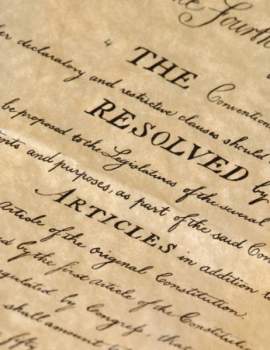
Understanding The Influence of The Bill Of Rights

Popular In Constitution
Purpose Of Lifetime Appointment And Pros And Cons Enumerated Powers Bicameral Legislature Background Article 3 Of The Constitution We The People 1st Amendment Who Wrote The Constitution Judicial Review Equal Protection Clause 5th Amendment 10th Amendment Three Fifths Compromise
Known as the Bill of Rights, the first 10 Amendments to the United States Constitution was officially ratified in 1791. The Bill of Rights offered American citizens undeniable rights, essential for maintaining a free country. The liberties offered in the Constitution ensured Americans that the central government would not abuse its power through tyranny or unjust actions. The Bill of Rights also offered the ability to express opinion and thought freely without the fear of Government persecution.
Written by James Madison, the first 10 Amendments
in the United States Constitution was originally met with skepticism. Led by
Alexander Hamilton, the Anti-Federalist Party believed that the inclusion of
individual rights into the Constitution was redundant and frivolous. The Bill
of Rights was adopted 3 years from the original drafting of the United States
Constitution. Considering the historical implications, the process to include
the Bill of Rights into the Constitution was fairly quick. However, the
influences for which it was built upon stem back centuries prior.
After the United States won the Revolutionary War
and subsequently earned its freedom, the adoption of a Constitution was
necessary for establishment purposes. The Revolution was spawned through
injustice enforced by the controlling British government. American settlers
grew embittered from constant taxes and wrongful convictions. Although the Bill
of Rights was created to free Americans from a powerful central government, its
influences, ironically, stem from British doctrines and literature. The
following are three substantial precursors which influenced the adoption of the
Bill of Rights into the United States Constitution:
The Magna Carta (1215)
In 1215, tired of immoral taxing
and arbitrary actions committed by the King, a group of English noblemen forced
King John to sign the Magna Carta. The legendary doctrine guaranteed common
citizens such fundamental rights as: the government must be fair and reasonable
with their actions, individuals are guaranteed a trial by jury, and due process
of law. The basic rights offered in the Magna Carta originally were awarded
solely to noblemen. However, the rights were eventually extended to all people
of society.
The Magna
Carta diminished a Monarch's absolute power and enabled all citizens basic
rights which impede tyrannous actions. The Magna Carta is still recognized as
an initial breakthrough for common citizens in regards to limiting governmental
powers. Like all civil codes, the United States Constitution used the Magna
Carta as a foundation upon which to build.
Petition of Right (1628)
Although the Magna Carta officially limited the
powers of the Monarchy, it was often by the King and his unjust policies. As
citizens grew furious over the Monarchy, the Parliament, or English legislature,
grew in influence. Parliament eventually refused the approval of more taxes
issued by King Charles I and forced him to sign the Petition of Right, which
prohibited the government from unlawfully arresting people and housing troops
in private homes without consent from the owner. This petition clearly
influenced the Third Amendment prohibiting soldiers from quartering on an
individual's private property and the Fifth Amendment of the United States Constitution.
Bill of Rights (1689)
The British version of the Bill of Rights guaranteed
all British subjects the right to bear arms and petition the King. This version
of the Bill of Rights also protected citizens from excessive bails, fines, and
cruel and unusual punishment. However, the British version protected far less
rights than the American Bill of Rights. The United States Constitution clearly
adopted provisions (protections against excessive fines, punishments, and
bails) found in the 8th Amendment, as well as a direct adoption of the 2nd
Amendment (right to bear arms.)
Amendments and provisions of the Bill of Rights
were undoubtedly adopted through British doctrine. However, a slew of domestic
individual liberties existed before the ratification of the United States constitution.
Before the creation of the English Bill of Rights, many colonies recognized
individual liberties through their own Constitutions.
For instance, in 1636, Rhode Island established itself as the first colony to recognize freedom of consciousness. In 1641, Massachusetts created the Massachusetts Body of Liberties which detailed a list of protections for the individual colonist. In 1649, Maryland extended the right to practice any religion.
Perhaps the greatest influence for the creation of the Bill of Rights can be found in The Virginia Declaration of Rights. Created by the author of the Bill of Rights himself, James Madison, The Virginia Declaration of Rights was published on June 12th, 1776. The Virginia Declaration offered 16 individual rights to its citizens, many of which were repeated in the first 10 Amendments in the Constitution.
NEXT: Understanding The Need For A Federal Government




















